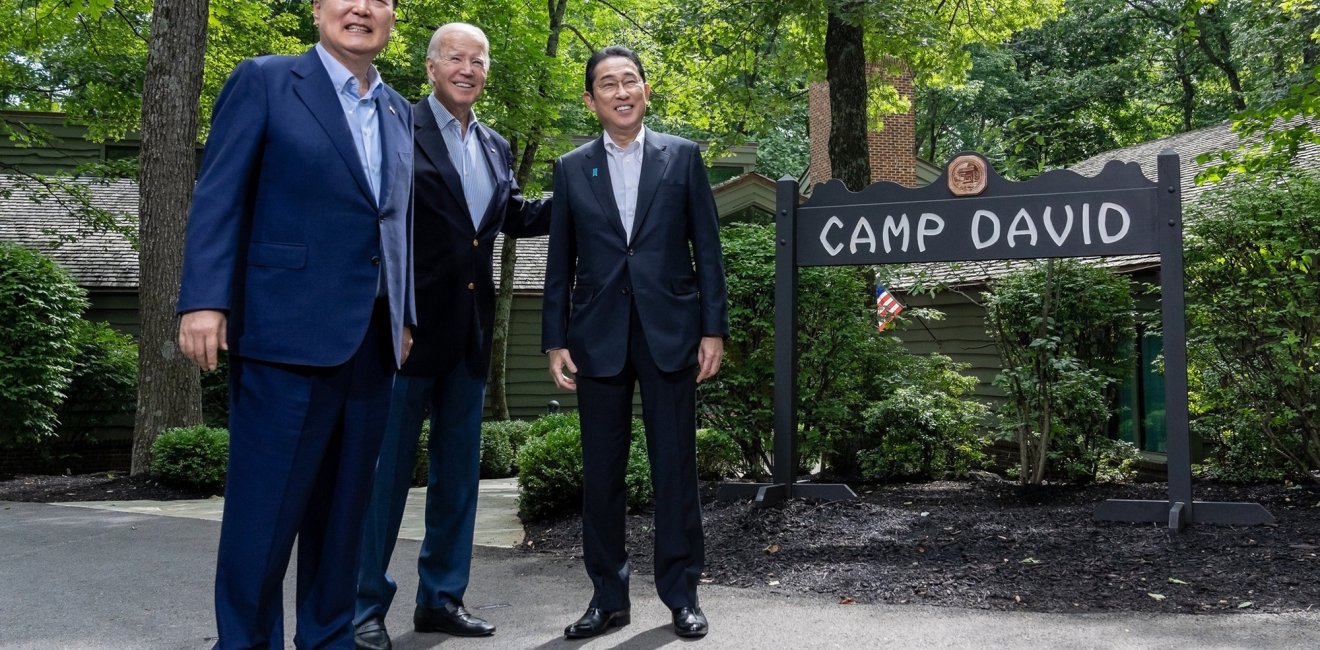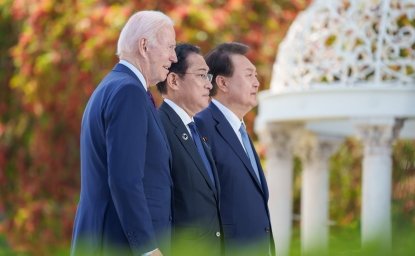
A blog of the Indo-Pacific Program
Historic was the word that many used in describing the Camp David summit between the United States, Japan, and South Korea on August 18. It marked the first time that leaders of the three countries met specifically for a trilateral discussion, and not simply meeting on the sidelines of an international conference. It was also the first time Joe Biden hosted foreign leaders at the Maryland retreat since taking office as president. It also was yet another step forward in improved relations between Tokyo and Seoul. The resulting Camp David Principles have emerged as the way forward to deliver on the historic meeting by providing a roadmap for the three countries to coordinate efforts on military security as well as economic stability. Yet even as a clear consensus has emerged about the need for coordination in pushing back against destabilizing threats from China and North Korea, the question remains about just how strong trilateral unity can be in light of domestic political considerations.
The focus on institutionalizing trilateral ties by all three countries is effectively to hedge against such political risks at home. In the case of the United States, a potential change in leadership after the 2024 elections may well mean that a new president will not be as motivated as Biden to attend trilateral meetings in the future. The goal of the Camp David Principles is to establish strong working relations between the three countries over the next year and ensure that the trilateral can be resilient to any changes in personal leadership. In short, by deepening defense cooperation and economic security coordination at the ministerial and working levels,efforts to address regional challenges together would not be thwarted by a no-show from a president.
The goal of the Camp David Principles is to establish strong working relations between the three countries over the next year and ensure that the trilateral can be resilient to any changes in personal leadership.
Yet the Camp David summit was by its very nature a top-down approach to diplomatic relations. The U.S. meeting would not have been possible in the first place without Korean President Yoon Suk-Yeol’s efforts to reach out to Prime Minister Fumio Kishida earlier this year, and the two leaders have come to personify a rapprochement between Korea and Japan. Yet President Yoon’s overtures have had their fair share of criticism within Korea. The two countries have simply agreed to shelve emotionally charged issues related to historical memory without reaching any resolution. At the same time, claims over the islet of Dokdo, as referred to by Korea, or Takeshima by Japan, remains another highly sensitive issue that could potentially hamper relations between the two countries.
Still, unity between Tokyo and Seoul will be critical in deterring aggressions by China. While Beijing has criticized the Camp David summit as a strategy to encircle and contain China, the ultimate success of the trilateral will be measured in its ability to prevent coercive Chinese action in the first place.
The leadership and agencies of Japan and Korea as well as the United States are now clearly in agreement that trilateral cooperation and coordination is necessary to confront the challenges facing the Indo-Pacific from the rise of authoritarian rule to a potential regional nuclear arms race to protecting critical and emerging technologies. Yet the political risks at home loom large and cannot be ignored. Institutionalizing cooperation by holding annual summit meetings, regular military joint exercises, and coordinating on enhancing economic security are certainly steps in the right direction, but ensuring grass-root support for closer cooperation between Tokyo and Seoul, and Washington’s unwavering commitment to the Indo-Pacific will be critical for the Camp David Principles’ lasting success.
Author


Indo-Pacific Program
The Indo-Pacific Program promotes policy debate and intellectual discussions on US interests in the Asia-Pacific as well as political, economic, security, and social issues relating to the world’s most populous and economically dynamic region. Read more


Hyundai Motor-Korea Foundation Center for Korean History and Public Policy
The Center for Korean History and Public Policy was established in 2015 with the generous support of the Hyundai Motor Company and the Korea Foundation to provide a coherent, long-term platform for improving historical understanding of Korea and informing the public policy debate on the Korean peninsula in the United States and beyond. Read more





